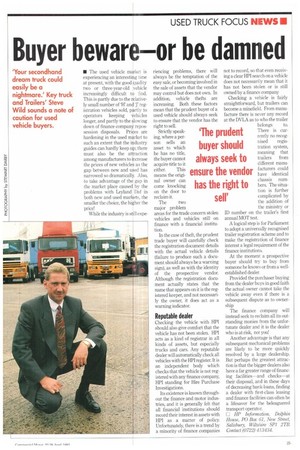Buyer beware or be damned
Page 27

If you've noticed an error in this article please click here to report it so we can fix it.
• The used vehicle market is experiencing an interesting time at present, with the good quality two or three-year-old vehicle increasingly difficult to find. This is partly due to the relatively small number of V' and T registration vehicles sold, partly to operators keeping vehicles longer, and partly to the slowing down of finance company repossession disposals. Prices are hardening in the used market to such an extent that the industry guides can hardly keep up; there must also be the attraction among manufacturers to increase the prices of new vehicles as the gap between new and used has narrowed so dramatically. Also, to take advantage of the gap in the market place caused by the problems with Leyland Drif in both new and used markets, the smaller the choice, the higher the price!
While the industry is still expe riencing problems, there will always be the temptation of the easy sale, or becoming involved in the sale of assets that the vendor may control but does not own. In addition, vehicle thefts are increasing Both these factors mean that the prudent buyer of a used vehicle should always seek to ensure that the vendor has the right to sell.
Strictly speaking, where a person sells an asset to which he has no title, the buyer cannot acquire title to it either. This means the original owner can come knocking on the door to reclaim it.
The two major problem areas for the trade concern stolen vehicles and vehicles still on finance with a financial institution.
In the case of theft, the prudent trade buyer will carefully check the registration document details with the actual vehicle details (failure to produce such a document should always be a warning sign), as well as with the identity of the prospective vendor. Although the registration document actually states that the name that appears on it is the registered keeper, and not necessarily the owner, it does act as a warning indicator.
Reputable dealer
Checking the vehicle with HPI should also give comfort that the vehicle has not been stolen. HPI acts as a kind of registrar in all kinds of assets, but especially trucks and cars. Any reputable dealer will automatically check all vehicles with the HPI register. It is an independent body which checks that the vehicle is not registered with any finance company, HPI standing for Hire Purchase Investigations.
Its existence is known throughout the finance and motor industries, and it is generally felt that all financial institutions should record their interest in assets with HPI as a matter of policy. Unfortunately, there is a trend by a minority of finance companies not to record, so that even receiving a clear HPI search on a vehicle does not necessarily mean that it has not been stolen or is still owned by a finance company Checking a vehicle is fairly straightforward, but trailers can become a minefield. From manufacture there is never any record at the DVLA as to who the trailer belongs to. There is currently no recog
nised registration system, meaning that trailers from different manufacturers could have identical chassis numbers. The situation is further complicated by the addition of the ministry or ID number on the trailer's first annual MOT test.
A logical step is for Parliament to adopt a universally recognised trailer registration scheme and to make the registration of finance interest a legal requirement of the finance institutions.
At the moment a prospective buyer should try to buy from someone he knows or from a wellestablished dealer.
Provided the purchaser buying from the dealer buys in good faith the actual owner cannot take the vehicle away even if there is a subsequent dispute as to ownership The finance company will instead seek to reclaim all its outstanding monies from the unfortunate dealer and it is the dealer who is at risk, not you!
Another advantage is that any subsequent mechanical problems are likely to be more quickly resolved by a large dealership. But perhaps the greatest attraction is that the bigger dealers also have a far greater range of financing facilities—and checks—at their disposal, and in these days of decreasing bank-loans, finding a dealer with first-class leasing and finance facilities can often be a lifesaver for the beleaguered transport operator.
0 HP Information, Dolphin House, PO Box 61, New Street, Salisbury, Wiltshire SP1 2TR Contact (0722) 413434.
















































































